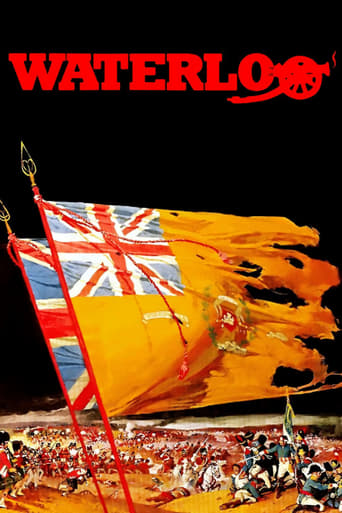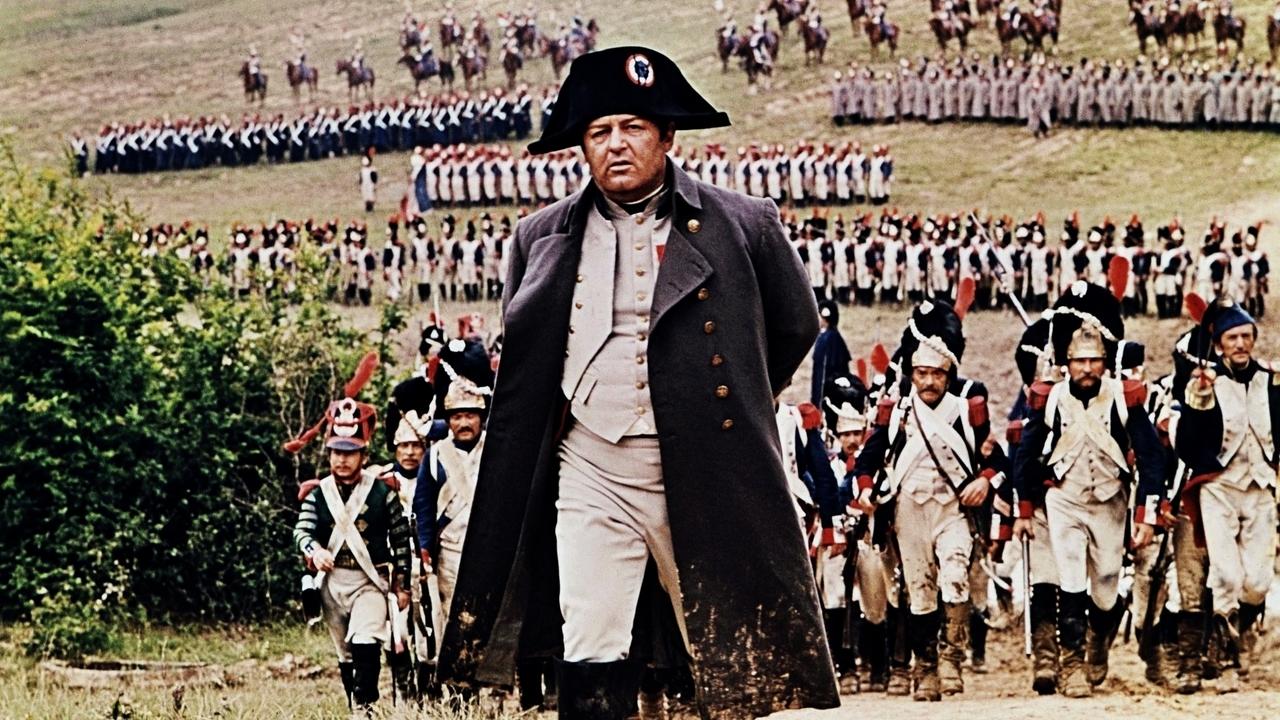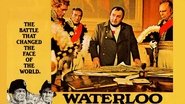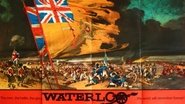Robert J. Maxwell
Napoleon (Steiger) escapes from exile in Elba, returns to France, defeats some enemies, and is himself defeated once and for all by Wellington (Plummer) at Waterloo in Belgium.I have no idea how closely this movie follows the historical event, never having been a Napoleon freak, but Rod Steiger is certainly different from David's heroic portrait, pointing the way to victory atop that fiery horse. (Cf., the ads for Napoleon brandy.) Napoleon's early victory's were behind him. He was fifteen years older now and had a bad case of the trots.Steiger makes him extremely gloomy, like that character in the Peanuts comic strips that walks around under a little cloud. What suffering. Steiger gives Napoleon two modes of speaking -- an ear-shattering shout or a hoarse hiss.His opposite number, the Duke of Wellington, who massacres the French troops with the aid of the Prussians, is played by Plummer as aristocratic, cool, and ironic. Wellington won more than the battle. He won more memorials than Napoleon. Wellington not only had a tasty dish of pastry-wrapped roast beef named after him, but a boot as well. What did Napoleon get? A high-calorie pastry. Well, come to think of it, there's that brandy, so maybe the battle was Wellington's but the memorials are a tie.The first hour of the movie shows us the character and circumstances of the two leaders. The handsome Wellington dances around in a palace, resplendent in crimson frock, making wisecracks, while Napoleon broods in drab gray, in pain, alone, carrying on with himself in an interior monologue. There is a brief appearance by a bloated Orson Welles as Louis XVIII. It's the high spot of the film because Welles treats the role as a joke. Otherwise humor is totally lacking.The second hour is -- well, you have never seen so many extras, whether or not half of them may have been mannequins, and no CGIs either. The battle is a confusing and muddy mess. BANG. BOOM. It goes on and on, obscured by smoke and a sudden storm. There are dead bodies in red and blue all over the vast landscape. It's impossible to follow the details of the engagement but easy enough to grasp the overall picture.Sergei Bondarchuk is quick to use crane and helicopter shots to capture all the money that was spent on the production. It must have cost as much as the original battle itself. But some of the shots are bizarre. An aide whispers something in Steiger's ear and there is a cut to an enormous close up of one -- just one -- of Steiger's eyeballs. The overall impression is that the direction was done by an amateur with an awful big budget.I'm recommending it though. Too many college students don't know who Napoleon was. If they've heard the name at all, it's been in the expression "Napoleonic complex." So I advise all high school kids to watch it. Look at the funny hats they wore.
Blueghost
The film is a bit of a high concept mess. You have to imagine the production team trying to figure out how to restage a "heroic" football game that went down in sports' legacy, because that's kind of what the battle of Waterloo is in military annals. The truth is that team competitions, including old style military field tactics, don't have much of a story to them. The action is the drama, not the individual soldiers themselves. As a young man I saw a re-edited version on TV, and like now, even after seeing a two hour version, I'm still at a loss as to the story.The acting is okay, if a bit overstated here and there. I actually worked with Rod Steiger many years ago, and he always struck me as exceptionally professional and a very caring individual. Having said that, I think he may have been misidrected as what he did here was to give the audience the power hungry "has-been" out to make a bid for a second chance at European dominance. It works after a fashion, but I think the performance gets overused. Napoleon, from all renditions I've seen of him, had his passions (and moments of rage), but he was also a strategist and tactician. Here Steiger shows us a Napoleon who is not so much a master tactician, but a kind of prodigal brat who shows us fury when pieces of his plan fail to fall into place. Steiger shows us a pensive man prone to fits. In this his acting really is unsurpassed, and he would reprise this character in Qadaffi's "Lion of the Desert".As for other performances, they all mostly hit their cues, but are hampered by an edit that is less than sterling. Plummer does an outstanding job of showing us a reserved Wellington, even if his expression does betray a somewhat impish actor trying to refrain from letting us in on how he gets into character. Others, including the actor who plays the Prince of Orange, do well, but sometimes let their inner Brit hold back a more vetted and thorough performance. Ergo there is a reserve in the thesping that works well, but also underscores the fact that we are watching a cast not of the nations contending for power in that period.Nearly every shot in act two is a battle sequence. The amount of artistry that went into staging the battle is superb, but ultimately what we get is a huge battle that is over acted, and not much drama, in spite of the interpersonal moments scattered here and there throughout the second act. It's pretty stunning to see the cavalry charges and Wellington's infantry forming square, but we're not privy to the actual maneuvers of the regiments on the field, nor why they were done. But, maybe the film makers are paying homage to the old notion that no battle plan lasts beyond initial contact with the enemy. Then again, maybe the lost third of the film would explain all those details.All in all the Hong Kong DVD edit that I have is a bit of an edited mess. You attach that to the fact that it is a Dino "b-grade-producer" De Laurentis flick, and you get something that looks like a high budgeted b-grade epic. My biggest critiques are as follows; Orson Wells as the King of France was a severe misstep. The camera work ranges from brilliant to poor. We gets zooms and pans in a number of shots. The exact kind of thing you want to avoid in films like this, and the film, as hampered as it is to begin with, suffers more for it, leaving a mess of a film that should have been one of the great epics shot at the time. My final critique is actually a bit of praise, and that is at least the producers actually got the size of the armies right, and could only do so by employing the only inexpensive Caucasian army around; the Soviet Union. That was a stroke of production genius, and we have the Kremlin to thank for getting the grandeur of the battle correct.Not a film I would readily recommend, but see it once if you're into historical epics. Missing footage equals missing story, which equals a film that could have been more, but ultimately falls flat as a total cinematic experience.
jc-osms
Perhaps the fact that I've a keen interest in history and not long ago read a biography of Wellington, drew me to nonetheless watch this big budget flop from the early 70's. Certainly in terms of scale it's a monumental achievement with the director's deployment of the huge numbers of combatants adding to the appreciation of the great generals themselves. With no computerised special effects in sight to artificially swell the numbers, the tableaux of blue versus red (and black) literally pops the eye and boggles the mind. While the bloodiness and brutality of the close combat scenes are not surprisingly toned down in deference to the censor, the cutaway final scene, where Wellington navigates his horse through the vast numbers of the dead, on a blood-soaked battlefield, tellingly conveys in complete silence the truth of Wellington's own words, quoted in the film, that there is only one thing more terrible than a battle lost and that is a battle won. The build up to the climactic battle is not unnaturally less engrossing, being a mixture of the French politics of the day, English societal mores and battle strategy, with a sprinkling of army humour to humanise and perhaps leaven somewhat the seriousness of everything else around it. The acting by the leads is variable, Rod Steiger, almost inevitably gives us The Method a- la-mode while Christopher Plummer somehow fails to convey the stature of Wellington while Orson Welles briefly bloats into view as the exiled French King Louie XXVII. This of course was the age of the anti-war movement which might explain the over-the-top (no pun intended) scene of a young English soldier screaming "Why are we killing each other" as he goes battle crazy as the film makes it point quite pointedly enough without the histrionics.
eamonnoriordan-273-283716
I saw this movie on its release in 1970 and was hugely impressed by all aspects of how it recreated the battle of Waterloo and how close it stuck to the original facts , its use of the original statements of Napoleon and Wellington and of course the thrilling cavalry charges which illustrated the shock and awe that someone facing such a charge must have felt .A few years later I spent a week on the site of the battlefield staying in a hotel just behind Wellington's tree from where he conducted most of the battle . During this time I walked every area of the battle , visited Hugomont and saw the evocative graves of the handful of french soldiers who managed to get over the walls and who were buried where they fell . The battle field has been preserved intact and one is struck by the closeness and intimacy of the conflict where Napoleon and Wellington stood on opposite ridges and were visible to each other at all times during the battle .As I am from Ireland I found it interesting to discover that the horses of Napoleon ( called Marengo ) and Wellington ( Copenhagen ) at Waterloo were bred in Co. Wexford at a place called Wellington Bridge and that in fact the two horses were half brothers ! I watched the DVD for the first time in 40 years last night and was struck by two things , how close the movie was to the actual topography of the real Waterloo , La Haye Sainte etc. and how miscast Christopher Plummer was .I admire Plummer and have followed his career but now in hindsight I feel he was too young for the part of Wellington particularly against such a strong force that was Rod Steiger's Napoleon . Plummer came across as effete and campy and his main forte seemed to be confined to delivering the witty quips and put downs used by Wellington which in no way did justice to the real Wellington whereas in contrast Steiger nailed the role of Napoleon .In fact I feel that Plummer could now play Wellington and do him justice much better at his present age ! I also feel that the over dramatic use of the display of arrayed cannon when the Old Guard was invited to surrender was unnecessary and completely over the top as the moment itself was both pitiful and glorious enough without embellishment . The simple French monument on the field of Waterloo today to the Old Guard is by far the most simple and moving of all the battle field's many monuments .Those criticisms aside I enjoyed the movie and would watch it again , it has aged well and if you want to know about ancient battles then this is the best battle movie of all time .



 AD
AD





